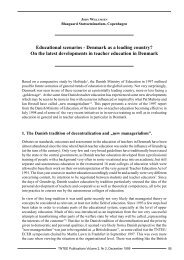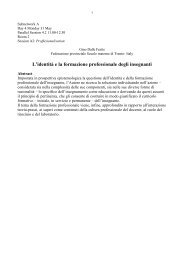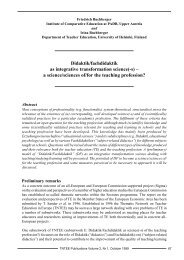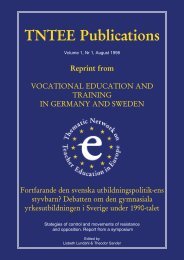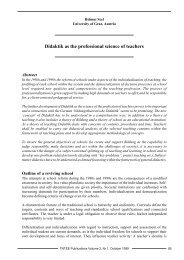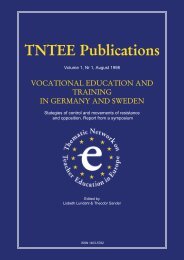TNTEE Publications - Didaktik/Fachdidaktik
TNTEE Publications - Didaktik/Fachdidaktik
TNTEE Publications - Didaktik/Fachdidaktik
You also want an ePaper? Increase the reach of your titles
YUMPU automatically turns print PDFs into web optimized ePapers that Google loves.
The Deutsche <strong>Didaktik</strong> and the American Research on Teaching<br />
been an independent discipline without any close relations with <strong>Didaktik</strong> and that the empirical<br />
influences have in general come from the US and from its psychology of education. In Berliner<br />
<strong>Didaktik</strong> the empirical approach is to be seen but gradually that part diminished with the work of<br />
Schulz. The contacts between German <strong>Didaktik</strong> and American research on teaching have been<br />
quite few.<br />
As a conclusion it can be said that the erudition-centered <strong>Didaktik</strong> did not gain a footing in the US<br />
in the beginning of this century. Instead, the reflection on teaching continued in the psychology of<br />
education. In Germany reform pedagogy transformed into erudition-centered <strong>Didaktik</strong> which later<br />
found some rival directions. The empirical-analytical approach did not succeed in making a<br />
breakthrough in Germany in spite of a good beginning with Meumann and Lay. It lived for some<br />
time as descriptive <strong>Didaktik</strong> but it did not develop into psychology of education. The latter received<br />
its impulses from the US and has been a separate area alongside <strong>Didaktik</strong>.<br />
The work of Peter Petersen is, however, very interesting from the viewpoint of German-American<br />
relations. Herman Röhrs (1993, 11–19) takes Petersen as an example from this interaction, as he<br />
analyses progressive education in the USA and its influence on European reform pedagogy. On the<br />
practical level the discussion about progressive education was international and the well-known<br />
systems of school reforms of Helen Parkhurst, Carleton Washburn, Maria Montessori, and Peter<br />
Petersen were influenced by each other. The “New Education Fellowship” was a connecting link<br />
between educational practical workers and researchers. In 1928 Petersen made a visit to the USA<br />
and became familiar with the American situation. This was later seen in his Jena-Plan. In spite of<br />
these kinds of relations between individual colleagues, the main trends in the area of <strong>Didaktik</strong> grew<br />
apart. Naturally, the political situation in the world contributed, but there were some ideological<br />
reasons, too.<br />
Some contemporary trends<br />
The role and the meaning of knowledge in educational research in recent years have clearly increased.<br />
Some interesting viewpoints have been brought into the terminology and communication. Shulman<br />
(1986b) has focused on teachers’ understanding of the subject they are teaching. In addition to<br />
content knowledge, the essential substance is pedagogical content knowledge. This same aspect<br />
has been referred to by different names, and Reynolds (1992, 5) introduces various alternatives<br />
which all have something special: content-specific pedagogy, subject-specific pedagogical<br />
knowledge, content-specific cognitional knowledge, and subject matter-specific pedagogical<br />
knowledge. (cf. also Gudmundsdottir and Shulman 1987, 54–55.)<br />
This old idea of pedagogical reduction of factual content for the purposes of teaching is known in<br />
the traditional German <strong>Didaktik</strong> as <strong>Fachdidaktik</strong>. The modern view of <strong>Fachdidaktik</strong> takes into<br />
consideration all the factors in the teaching-learning process from the content point of view. It was<br />
Ch. Helwig who as early as 1619 made a distinction between the common aspects of teaching<br />
(didactica generalis) and the content aspects of teaching (didactica specialis) (Knecht-von Martial<br />
1985, 17–28). The idea, however, in spite of the use of different language, has always been known<br />
to parents and teachers. In any case, this comparison between pedagogical content knowledge and<br />
<strong>Fachdidaktik</strong> could offer useful knowledge to both sides.<br />
The renaissance of content has aroused the idea of comparing the erudition-centered <strong>Didaktik</strong> with<br />
the new conception of research on teaching. Stephan Hopmann (1992) as well as Gudmundsdottir<br />
and Grankvist (1992) have already made a start in this respect. The latter also say that the new trend<br />
had nothing to do with the European <strong>Fachdidaktik</strong> (1992, 185). Although the idea looks the same<br />
there are essential differences.<br />
<strong>TNTEE</strong> <strong>Publications</strong> Volume 2, Nr 1, October 1999 29



